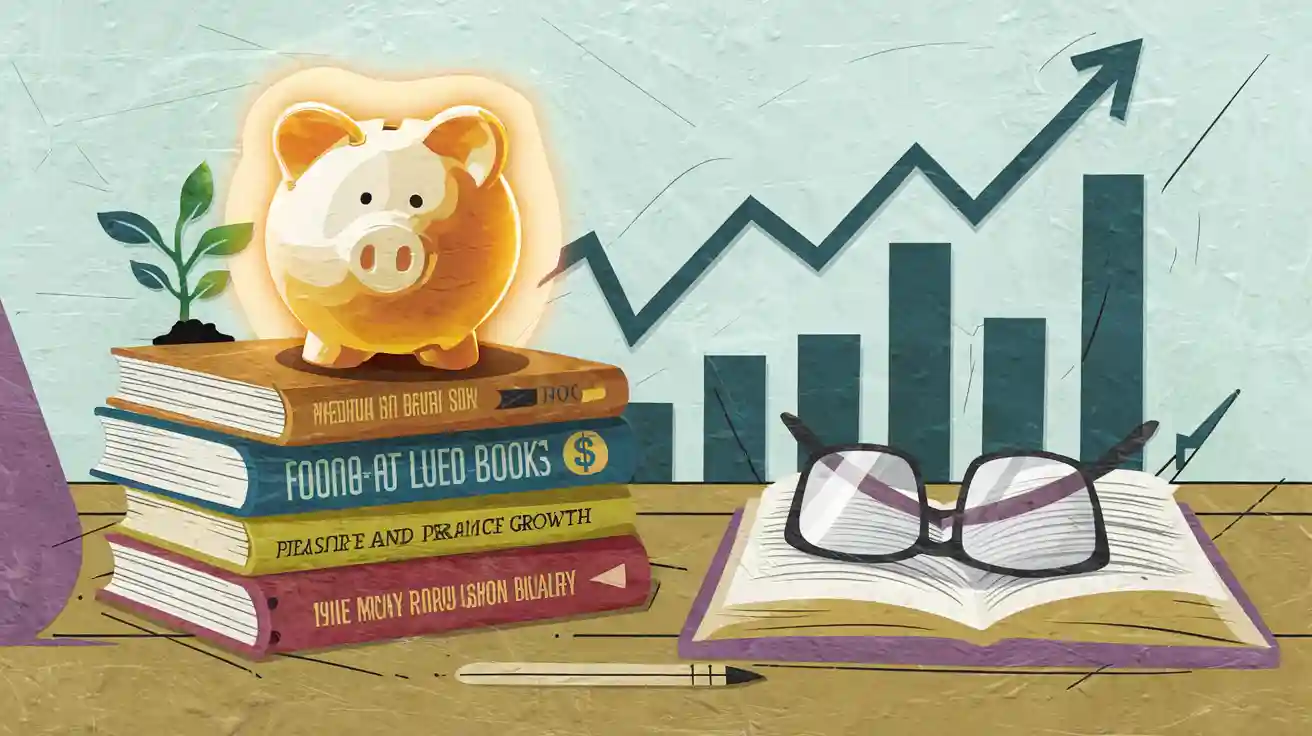
You may have noticed how financial insecurity often feels heavier for women. This isn’t just a personal struggle—it’s a systemic issue. Women face unique barriers that make financial stability harder to achieve. For example:
Women earn less than men in similar roles, creating long-term disadvantages.
Single-mother families are over five times more likely to live in poverty than married-couple families.
By 2030, an estimated 342.4 million women and girls will live on less than $2.15 a day.
These challenges, combined with societal pressures and cultural expectations, can lead to money scarcity fears. They don’t just affect your wallet—they impact your mental health, confidence, and sense of security.
But here’s the truth: understanding these barriers is the first step toward breaking free from them.
Key Takeaways
Understand that many women feel money fears due to unfair systems and social expectations.
Change your thinking from fear to plenty by seeing problems as chances and being thankful.
Learn about money through lessons and tools to make smart choices.
Make simple money goals and break them into small steps to feel less stressed.
Get help from groups and speak up to fix unfair systems, building confidence and friendships.
Understanding Money Scarcity Fears
What Are Money Scarcity Fears?
Money scarcity fears stem from the belief that financial resources are limited and that you may never have enough to meet your needs. This fear can manifest in various ways, such as impulsive spending, hoarding money, or avoiding necessary expenses. Stephen Covey, in his influential work, described the scarcity mindset as the belief that wealth and opportunities are finite. This mindset fosters fear and limits your ability to make confident financial decisions.
When you operate from a place of scarcity, it’s easy to feel trapped. You might find yourself constantly worrying about money, even when your financial situation is stable. This fear-based thinking can prevent you from pursuing opportunities that could improve your financial well-being.
Common Triggers of Money Scarcity Fears
Several factors can trigger money scarcity fears, especially for women. These triggers often stem from financial insecurity or past experiences. Here are some common examples:
Fear-based spending or hoarding: You might spend impulsively to feel in control or hoard money out of fear of losing it.
Short-term focus: Prioritizing immediate needs over long-term planning can make it hard to save or invest.
Undervaluing your skills: A scarcity mindset may lead you to undercharge for your work, resulting in chronic under-earning.
Fear of financial risk: Excessive caution can stop you from taking steps that could lead to growth, like investing or starting a business.
Fear and anxiety often accompany these behaviors, making it even harder to break free from the cycle of scarcity.
The Scarcity Mindset and Its Origins
The scarcity mindset doesn’t appear out of nowhere. It often develops from experiences of deprivation or financial instability. Research by Eldar Shafir and Sendhil Mullainathan shows that living with limited resources can consume your mental bandwidth. This focus on immediate needs makes it harder to plan for the future, leading to financial mistakes.
For women, societal pressures and cultural expectations can amplify this mindset. If you’ve ever felt like you had to choose between career advancement and family responsibilities, you’ve likely experienced the effects of scarcity thinking. Recognizing these origins is the first step toward shifting your perspective and embracing a mindset of abundance.
Why Women Experience Money Scarcity Fears
Societal and Cultural Influences
Society plays a significant role in shaping how you view money. Cultural norms often place women in caregiving roles, which can limit earning potential and financial independence. These expectations may lead you to prioritize others’ needs over your own, reinforcing a scarcity mindset. Social comparison, especially on platforms like Instagram, can amplify feelings of inadequacy. Seeing others’ curated lifestyles might push you toward unnecessary spending or financial decisions driven by fear.
Financial socialization also begins early. If your family avoided discussing money, you might have grown up with confusion or anxiety about finances. This lack of open dialogue can perpetuate fear-based behaviors, such as hoarding cash or avoiding necessary expenses. These societal and cultural influences create a cycle where money scarcity fears feel inescapable.
Psychological and Emotional Factors
Your emotions significantly impact how you handle money. Fear and anxiety often lead to behaviors like hoarding cash or ignoring bills, which only deepen financial stress. Studies show that 51% of women report money negatively affects their mental health, compared to 42% of men. This emotional toll can make it harder for you to break free from the scarcity mindset.
Feelings of guilt and shame also play a role. You might feel guilty about spending on yourself or ashamed of past financial mistakes. These emotions can cause avoidance behaviors, like neglecting to check your bank account or delaying important financial decisions. Social comparison further fuels these feelings, making you question your worth and capabilities. Over time, these psychological factors can erode your confidence and keep you stuck in a cycle of financial anxiety.
Emotional Factor | Impact on Financial Anxiety |
|---|---|
Fear and anxiety | Can lead to hoarding cash or avoiding necessary expenses. |
Guilt and shame | May result in avoidance behaviors like ignoring bills. |
Social comparison | Fuels feelings of inadequacy, leading to unnecessary spending. |
Financial Literacy and Confidence Gaps
A lack of financial literacy often leaves you feeling unprepared to manage money effectively. Research shows that women consistently score lower than men on financial literacy assessments. For example, only 15% of women correctly answer more than half of financial literacy questions, compared to 60% of men. This gap is especially pronounced in areas like investing, where women lag behind by 13 percentage points.
This knowledge gap can make you hesitant to take financial risks, such as investing or starting a business. Without confidence in your financial skills, you might undervalue your abilities or avoid opportunities for growth. The scarcity mindset thrives in this environment, convincing you that financial success is out of reach. By addressing these gaps, you can build the confidence needed to overcome money scarcity fears and take control of your financial future.
The Emotional Toll of Money Scarcity Fears

Stress and Anxiety
Money scarcity fears often take a toll on your mental health, creating a cycle of stress and anxiety that feels impossible to escape. When you constantly worry about having enough, your body stays in a heightened state of alertness. Elevated cortisol levels, the stress hormone, can leave you feeling drained and overwhelmed. This chronic anxiety makes it harder to focus on long-term goals, keeping you stuck in survival mode.
Fear and anxiety related to money scarcity can lead individuals to hoard cash or avoid necessary expenses. This anxiety may also result in impulsive financial decisions, such as selling investments during market downturns.
You might find yourself hyper-focused on potential threats, like unexpected bills or economic downturns. This mindset can impair your decision-making, leading to choices that worsen your financial situation. For example, you may avoid investing or delay paying off debt, which only increases your stress over time.
Shame and Guilt
Feelings of shame and guilt often accompany money scarcity fears, especially for women. You might feel ashamed of past financial mistakes or guilty for spending on yourself. These emotions can weigh heavily on your mental health, making it harder to take proactive steps toward financial stability.
Avoidance behaviors often stem from these feelings. You might ignore bills, avoid checking your bank account, or delay seeking financial advice. This avoidance creates a vicious cycle where guilt and shame deepen, leaving you feeling stuck. Social comparison can make this worse. Seeing others’ financial success might lead you to question your own worth, further reinforcing these negative emotions.
Self-Doubt and Missed Opportunities
Money scarcity fears can erode your confidence, leading to self-doubt that holds you back. You might undervalue your skills or hesitate to negotiate for better pay. This hesitation often results in chronic under-earning, which reinforces feelings of inadequacy.
Fear of vulnerability can prevent you from taking risks, like starting a business or pursuing a promotion.
Scarcity thinking may cause you to undervalue your abilities, leading to missed opportunities for growth.
When you doubt yourself, you limit your potential. Over time, this self-doubt can prevent you from achieving financial independence and realizing your dreams. Recognizing these patterns is the first step toward breaking free and embracing your worth.
Strategies to Overcome Money Scarcity Fears

Shift from Scarcity to Abundance Mindset
Changing your money mindset is the first step toward overcoming money scarcity fears. Shifting from a scarcity mindset to an abundance mentality allows you to see possibilities instead of limitations. This change doesn’t happen overnight, but small, intentional actions can make a big difference.
Start by reframing how you view challenges. Instead of seeing them as obstacles, treat them as opportunities for growth. For example, if you face a financial setback, ask yourself what lessons you can learn from it. Practicing gratitude also helps. Focus on the financial resources you already have, no matter how small. This simple habit can shift your perspective from lack to abundance.
Research shows that adopting an abundance mentality reduces stress and anxiety while fostering creativity and resilience. It also encourages collaboration over competition, helping you build stronger connections with others. When you embrace this mindset, you open yourself up to new opportunities and shared success.
Build Financial Literacy and Confidence
Financial education is a powerful tool for breaking free from money scarcity fears. Many women feel unprepared to manage their finances due to gaps in financial literacy. Studies reveal that only 15% of women correctly answer more than half of financial literacy questions, compared to 60% of men. This lack of confidence can hold you back from making informed decisions.
You can start building your financial knowledge by learning the basics of budgeting, saving, and investing. Online courses, books, and workshops are excellent resources. As you gain knowledge, your confidence will grow. You’ll feel more equipped to take financial risks, like investing or negotiating for better pay.
Remember, financial education isn’t just about numbers. It’s about empowering yourself to make decisions that align with your goals. When you understand your finances, you take control of your future.
Set Realistic Financial Goals
Setting achievable financial goals gives you a clear path forward. Without a plan, it’s easy to feel overwhelmed or stuck. Start by identifying what matters most to you. Do you want to save for a home, pay off debt, or build an emergency fund? Break these goals into smaller, manageable steps.
Realistic goals help you stay focused and motivated. For example, instead of aiming to save $10,000 in a year, start with $200 a month. This approach makes your goals feel attainable and reduces the stress of trying to do too much at once.
Studies show that women who set clear financial goals experience greater financial security. By creating a roadmap, you can track your progress and celebrate small wins along the way. This practice builds confidence and reinforces your belief in your ability to succeed.
Cultivate Gratitude and Positive Habits
Gratitude is a powerful tool for overcoming money scarcity fears. When you practice gratitude, you train your mind to focus on what you have instead of what you lack. This shift helps you see the world through a lens of abundance. Regular gratitude practice also reduces stress, improves your overall well-being, and strengthens your ability to handle financial challenges.
Start by keeping a gratitude journal. Write down three things you’re thankful for each day. These could be as simple as a supportive friend or a meal you enjoyed. Over time, this habit rewires your brain to notice the positives in your life.
“Gratitude turns what we have into enough.” – A powerful reminder that appreciating the present can counteract fear-based thinking.
Cultivating generosity is another way to reinforce abundance. Small acts of kindness, like donating to a cause or helping a friend, create a cycle of giving and receiving. These actions remind you that resources are not finite and that sharing strengthens your sense of security. Generosity also benefits your mental health, making you feel more connected and fulfilled.
Positive habits, like mindful spending and saving, complement gratitude. When you align your financial choices with your values, you feel more in control. These habits reduce fear-driven behaviors, helping you build a healthier relationship with money. By focusing on gratitude and positive actions, you can break free from the scarcity mindset and embrace a life of abundance.
Seek Support and Advocate for Change
You don’t have to face money scarcity fears alone. Seeking support from others can make a significant difference. Surround yourself with people who uplift and encourage you. This could include friends, family, or even a financial coach. Sharing your struggles and goals with trusted individuals helps you feel less isolated and more empowered.
Joining communities of like-minded women can also provide valuable insights and resources. Online forums, local groups, or workshops focused on financial literacy can connect you with others who share similar experiences. These spaces offer a safe environment to learn, grow, and celebrate progress together.
Advocating for change is another way to address the systemic issues that contribute to money scarcity fears. Speak up about pay equity in your workplace or support policies that promote financial equality. When you advocate for yourself and others, you challenge the societal norms that perpetuate financial insecurity.
Tip: Start small by having open conversations about money with your peers. Normalizing these discussions can lead to greater awareness and collective action.
By seeking support and advocating for change, you take control of your financial journey. You not only empower yourself but also contribute to a future where financial security is accessible to all.
Money scarcity fears may feel overwhelming, but you have the power to overcome them. By shifting your mindset, building financial literacy, and seeking support, you can rewrite your financial story. Savings groups, for example, empower women to achieve independence and create safety nets. Community involvement fosters shared decision-making and supports entrepreneurial growth. These steps not only improve your financial future but also inspire confidence and self-belief. Remember, financial empowerment is about more than money—it’s about freedom, opportunity, and embracing your worth.
FAQ
What is the first step to overcoming money scarcity fears?
The first step is recognizing the fears and understanding their root causes. Awareness helps you identify patterns and triggers. Once you know what’s holding you back, you can take actionable steps to shift your mindset and regain control over your financial decisions.
How can I build confidence in managing my finances?
Start small by learning the basics of budgeting and saving. Celebrate small wins, like sticking to a budget for a month. As your knowledge grows, so will your confidence. Surround yourself with supportive communities or mentors who can guide and encourage you.
Why is shifting to an abundance mindset important?
An abundance mindset helps you focus on possibilities instead of limitations. It reduces stress and opens you to opportunities for growth. This shift empowers you to make decisions that align with your goals, paving the way for financial independence and a more fulfilling life.
How can I stay motivated while working toward financial goals?
Break your goals into smaller, achievable steps. Celebrate progress, no matter how small. Practicing gratitude and focusing on what you’ve accomplished keeps you motivated. Surround yourself with positive influences who inspire and support your journey.
What resources can help me improve my financial literacy?
Online courses, books, and workshops are great starting points. Look for resources tailored to women’s financial needs. Joining financial literacy groups or communities can also provide valuable insights and support as you build your knowledge.






